Celebrating 50 Years of Cullen Wines with January Sundowners
This year we celebrate 50 years of Cullen Wines; 50 years of sustainable wine growing preceded by 65,000 years of Wadandi sustainable land care, and I’d love you to be part of the celebration. Together we’ll share memories and raise a toast to everyone whose hard work and support has taken our family business from small beginnings to a world-class biodynamic and carbon positive winery.
For fifty years we’ve been supported by generous people with a wonderful spirit of comradery and warmth of spirit, and we are so grateful. Everybody has a story about their involvement in Cullen’s. We love hearing the memories, and we are so thankful for all those people that have contributed to this wonderful journey.
As we begin the celebrations, I’d love to share memories and my parents’ dream – to make great wine, sustainably – and to thank you for being part of the journey.
Vanya Cullen
January 2021
Please celebrate with us
January Sundowners: Every Friday and Saturday from 2nd – 22nd January. 4-7pm.
Free entry, food and wine available to purchase. Details: http://bit.ly/january-sundowners
50 Year Celebration Sundowner: Saturday 23 January. 4-7pm. Tickets $25 includes wine, canapes, and live music by Cassandra Charlick. Tickets: http://bit.ly/sundowner-tickets
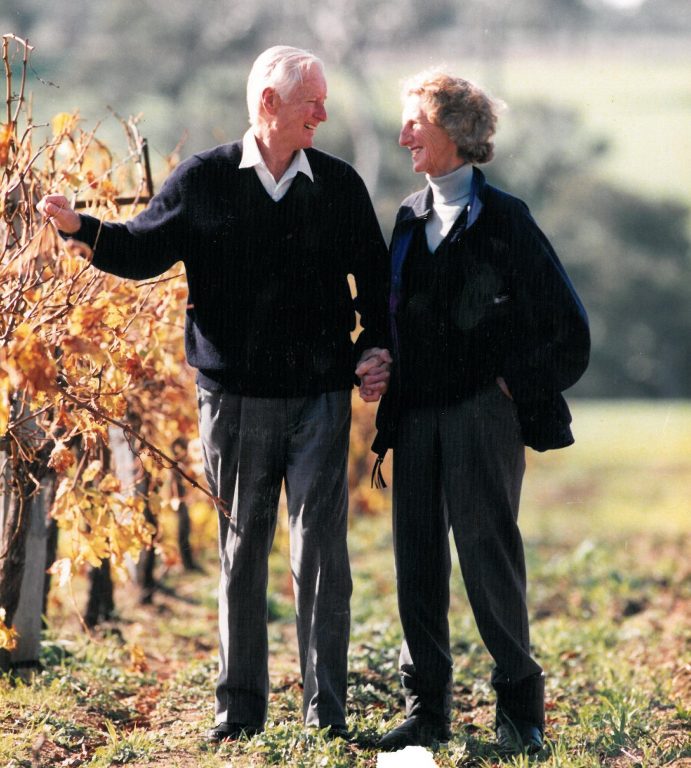
Above: Dr Kevin John and Diana Madeline Cullen
Diana Madeline and Dr Kevin John Cullen
In 1971, mum and dad were pioneers in the region. Mum was a physiotherapist, dad a doctor, and they farmed cattle and sheep. About to plant lupins, their good friend Dr John Gladstones said “You’d be mad to plant lupins, you should plant grapes!” He’d just completed the now-famous study on wine growing and knew we had the land to grow the best quality wines. It sowed the seed for their involvement in the trial block, in what is now Juniper Estate, in 1966. Dad called the first grape growers meeting in Busselton in 1966, but the head of the agriculture department was a teetotaller, so he wasn’t that encouraging of people planting grapes.
It was a poorer, rural community back then, with no pool of trained labour. No-one really knew anything about growing grape vines, but there was a wonderful community of people who worked together, planting trial blocks and each other’s vineyards. They had to learn everything from books and by visiting wine regions themselves.
Dad always said it was 1% inspiration, 99% perspiration, and it certainly was, particularly during planting in 1971. It wasn’t until 1994 – the year dad passed – that he found out that we’d finally broke even.
Our commitment to environmental sustainability came long before the wine making. My grandmother was a suffragette and nature photographer, and mum and dad fought hard to try and save Lake Pedder during their time in Tasmania. After moving to Busselton in 1948, they worked with friends to have an environmental act passed through parliament stopping the mining of bauxite; the whole Cape to Cape coastline was earmarked for bauxite mining.
They had this incredible passion for the pristine natural environment, which translated into always wanting to make the best quality wine. Dad saw the effects of chemicals on his patients and mum had developed a love of nature from growing up in Tasmania.
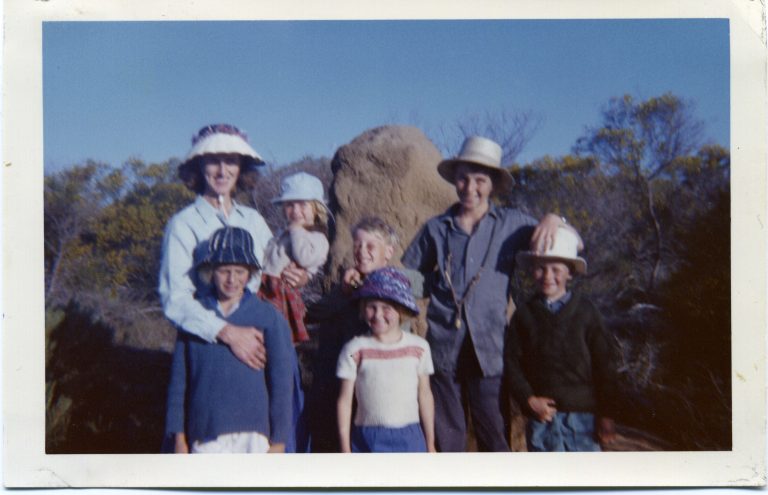
Diana Madeline with her six children: Vanya, Ariane, Shelley, Stewart, Digby and Rick.
A big-hearted community
So many wonderful people have been involved in Cullen’s, right from the beginning. Thinking about all these people who have cared and contributed to Cullen’s is a little overwhelming, thinking how to acknowledge and pay tribute to their support. Little was written down, but these are my recollections of the stories shared at our table.
We were surrounded by incredible people; Terry and Geraldine Merchant, Murray and Marjorie Neeve, the Russell family – Annie, Bill, Will and Colin, Ellis Butcher and his family, just to mention a few. It was these hardworking local farmers that put this place on the map. Mum and dad were in partnership with the Merchants to start off with, and then bought them out.
Bill Jamieson, another great friend of mum and dad’s, used to judge the whole of the Perth Show by himself. Nowadays we have consultants, but Bill would come down at weekends and was a wonderful man and support to the pioneer wine growers.
Now people come into the Biodynamic Wine Room and tell us their story about their involvement in Cullen’s; often stories about how mum and dad helped them. They’re often very emotional and it’s wonderful to hear these stories and connections. It’s people that make a place, and we go forward with a collective consciousness of gratitude.
I had a letter last year from a couple who visited our cellar door during their honeymoon. Mum had taken them around the cellar and given them a full tasting and a bottle of 1991 Cabernet as a wedding present, and they were drinking it to celebrate 25 years of marriage. They sent a beautiful letter saying, “We just want you to know that Cullen wines and your mum are a very happy part of our marriage”.
It’s a joy to hear these memories, and I’d love you to share your happy recollections at our January sundowners, by email or however you can connect with us this year.
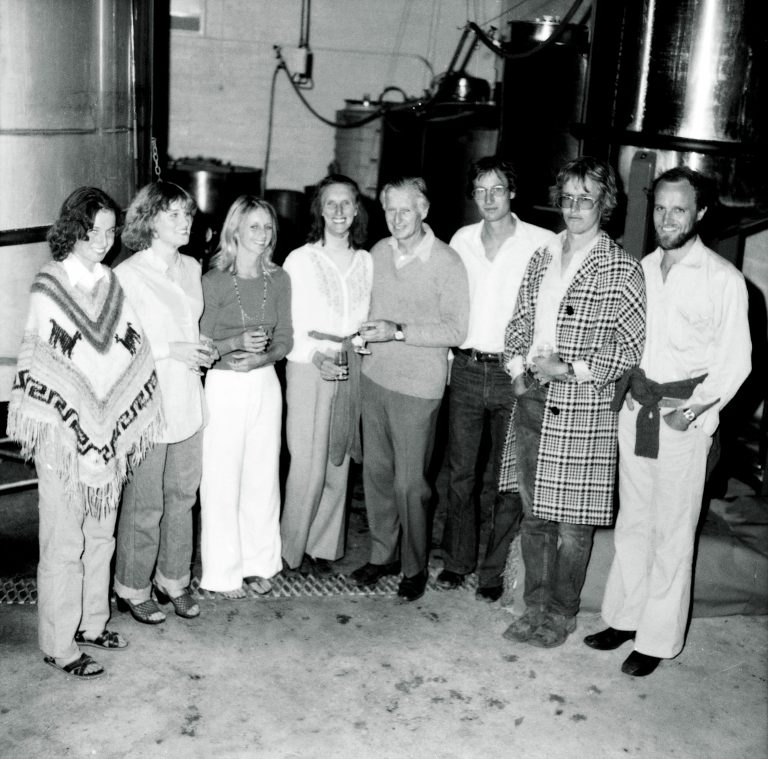
Above: The Cullen Family – Diana Madeline and Dr Kevin John (centre) with Vanya, Ariane, Shelley, Rick, Digby and Stewart.
Growing up with Cullen Wines
Mum and dad had six children, and we’re all owners of Cullen Wines. As children we were always out and about on weekends, at the beach or working on the farm. It was an outdoors, nature-based existence – a wonderful dreamlike childhood.
Mum had a knack for making everything seem fun. She had a thermos of tea and she made lemon slice with very thick icing, a reward for picking up sticks and working in the vineyard.
Mum and dad were always working on the farm or in the vineyard, and it was a struggle in the sense of no one really knew – they were learning so much along the way, experimenting. But everybody worked together as a community, helping each other, and I remember that sense of excitement whenever anyone on an award.
My sister Shelley set up the first food bar serving Cornish pasties and toasted sandwiches and the infamous vineyard platter with crusty bread. Back then all these poor people were travelling and tasting wine but there weren’t many places offering food. Shelley came up with the name crusty bread because it was just recycled, toasted bread from yesterday.
All of us did our time working at cellar door and promoting in Perth – including Ariane, Digby, Stewart and Rick. We planted vines, worked in the vineyard and at vintage. Digby helped build the winery and painted the whole thing, and there’s a picture of him with glasses covered in white paint.
Eventually I went to Adelaide to study music, and dad enrolled me in the wine course. I returned with a science degree and a graduate wine diploma from Roseworthy in 1986. After working vintages in California and Burgundy I said to mum, “I need to take over as full winemaker otherwise I want to go somewhere else”. So, she agreed, but then there was that jostling between two very strong-willed people.
Mum would say “Fine, no worries, dear.” Once, I went away promoting, and I rang up to find out what was happening with the Riesling fruit, as we’d agreed not to make a Riesling, and she said, “Oh dear, we bottled it last week.”
There was also the time I was supposed to be sampling the grapes, but in walks mum beautifully dressed with a scarf, matching belt and shoes, exclaiming “Oh, I tasted the grapes. They taste yummy!” I loved driving around the vineyard every evening with mum, checking all the grapes. The vintage after she passed away I just had this sense of her being there saying, “Yummy, dear!”
Fortunately, mum and I both believed in making the best quality wine, so regardless of our differences, we always agreed within that.
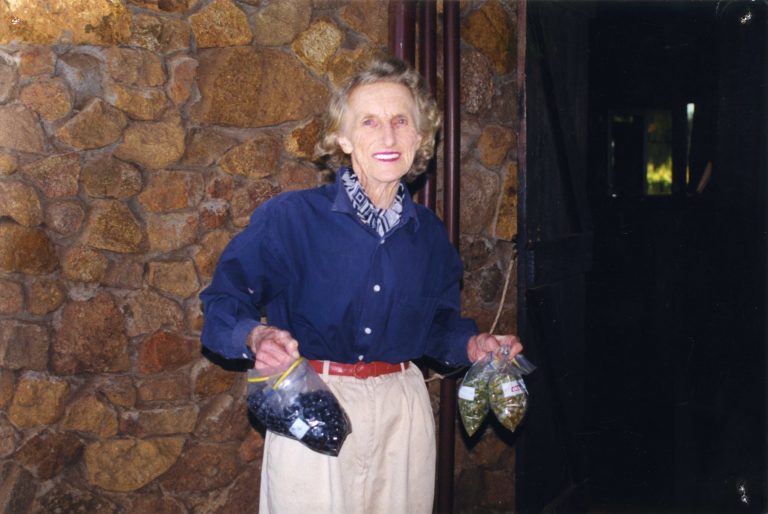
Diana Madeline sampling grapes
The vineyards and wines
Cullen’s began in 1971 with Cabernet and Riesling plantings, in the Wilyabrup region with its red ochre soils. Then in 1976 Sauvignon Blanc and Semillon. Dad had sent a letter in 1967 requesting Chardonnay cuttings and we didn’t get the cuttings until 1976. Plantings happened bit by bit, with the Mangan vineyard planted 1995 to 1997. The Mangan vineyard is just a little further south, on the ocean side of Caves Road, with different soils and topography, giving us wines that are quite different to those grown on the Cullen vineyard.
Mum and I transitioned to organic and then biodynamic. The land has to be sustained to grow great wine; when you plant an introduced species you take something out of the soil, so you have to give something back. Biodynamics is as complex as nature, and we use animal, mineral and plant substances, applying them when the planets are favourably aligned. This microbiological life enlivens the land, the vines, the grapes and hence the wine. We use biodynamic preparations 500 to 508, and it’s BD 500 and 501 that give us our biodynamic certification over organic. BD 500 is a biodynamic preparation containing billions of micro flora, and B12 that synthesizes nitrogen and drives the whole thing.
It’s the soil intelligence and connection that makes biodynamics so special; and it connects to all aspects of our business. In the winery the wines really make themselves. We don’t add yeast or acid, and as a result the wines are the purest expressions of place.
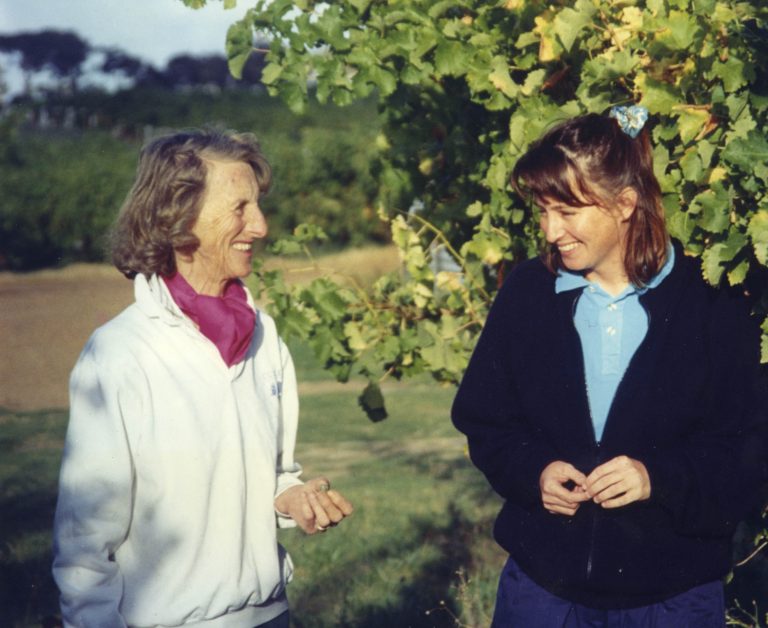
Above: Diana Madeline and Vanya Cullen
Successes
In 1976 we won our first gold medal in Melbourne for our Cabernet Sauvignon. Prior to that we sold all the wine by the bottle – we never sold cases. Then someone ordered five dozen and it was such a big deal for us.
The three words that define the Cullen philosophy are quality, integrity and sustainability. We are the only biodynamic and carbon positive winery in the region, sequestering more carbon than we emit. It’s the land that makes great wine, and here we are in Wilyabrup – a place picked by John Gladstones as ideal for growing Cabernet Sauvignon, enlivening the soil with biodynamics and making the best wines possible.
Sustainability is in every part of the business; we reduce our emissions through lightweight glass bottles, because glass is one of the highest contributors to our carbon dioxide emissions. We changed from glossy painted cardboard to brown cardboard, and to screwcap so we don’t get the wastage associated with cork. Cover crops between the vines synthesize nitrogen, sequester carbon and gives us healthy soil. Carbon sequestration has been our biggest success in terms of our carbon footprint.
Recently we’ve gone from a two-hatted restaurant with 26 dishes on our menu, to a simpler offering where 90% of our food is grown right here in our Cullen garden. The menu is simpler and pure, and there’s no wastage.
That this family owned business is now globally respected, carbon positive and producing biodynamic wine is our greatest legacy.
Events to Celebrate 50 years
We begin the 50 year celebrations with a series of lightweight and fun sundowners in January with music on Friday and Saturday nights. Followed by a more formal ticketed sundowner on Saturday 23 January.
Everyone is welcome at these sundowners, to celebrate while the weather is so lovely.
January Sundowners: Every Friday and Saturday from 2nd – 22nd January. 4-7pm. Free entry, food and wine available to purchase.
Details: https://www.cullenwines.com.au/events/sundowners-january-2021/
50 Year Celebration Sundowner: Saturday 23 January. 4-7pm. $25 tickets available to purchase. Wine, canapes and live music by Cassandra Charlick. Taste wine from the Cullen museum.
Tickets: https://www.cullenwines.com.au/product/50-years-celebration-sundowner/
We are planning more events as the year progresses, and will keep you updated:
Diana Madeline launch: Friday 10, Saturday 11 and Sunday 12 February. Four course lunch at the restaurant. Tickets available soon.
Kevin John Diana Madeline Legacy Awards: June 2021. Date to be confirmed.
36th Annual Chardonnay Tasting: November 2021. Date to be confirmed.
50th Chardonnay Tasting: Date to be confirmed.
Kevin John 2020 launch: Monday 22 November.